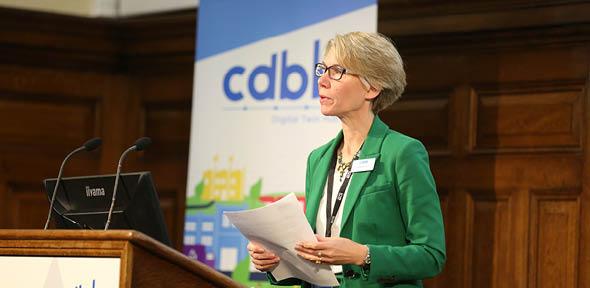
Submitted by Angela Walters on Thu, 01/07/2021 - 10:31
Alexandra Bolton, Executive Director, CDBB on the upcoming Cyber-Physical Fabric Summit
The pandemic has highlighted the need to make better, data-driven decisions that are focussed on creating better outcomes. It has shown how digital technologies and the data that drives them are key to putting the right information in the right hands at the right time to ensure that we make the right decision to achieve the right outcomes. Connected ecosystems of digital twins, part of the cyber physical fabric, will allow us to share data across sectors, in a secure and resilient fashion, to ensure that we can make those important decisions for the outcomes that we need. They provide us with a transformative tool to tackle the major issues of our time, such as climate change, global healthcare and food inequality.
We must use digital twins for the public good, as set out in “Data for the Public Good”, and we must also use those digital twins to create a better future for people and the planet. The recent publication of the Vision for the Built Environment sets out a pioneering vision for the built environment, and we want to see that vision expanded further, to include other sectors, such as health, education, manufacturing and agriculture.
As the UK considers what a national digital twin might look like, we draw on the experience of the past three years to add to the discussion. A UK national digital twin must have a purpose-built delivery vehicle that works through coordination, alignment and collaboration. It needs to bring together those working in the field, across sectors, across industries, and across government departments. It must balance the need for research, both within academic institutions and industry, with the industry implementation and adoption that is already underway. And it must ensure that the programme is socio-technical in nature; if we concentrate solely on the technical factors, while failing to address the equally important social considerations, we risk creating a solution that cannot or will not be adopted – a beautiful, shiny, perfect piece of ‘tech’ that sits on a shelf gathering dust.
There are many in the UK doing fantastic work in the digital twin space, and the wider cyber-physical fabric of which connected digital twins are a part. We know from experience that we get much better outcomes when we work together as a diverse team, rather than in siloes which lead to fragmentation. Industry is already creating digital twins and connecting them to form ecosystems. If we are to avoid divergence, we have to act now.
To start the discussion and allow the sharing of thoughts and experience, the Royal Academy of Engineering has convened an open summit, hosted by the DT Hub on the 19th July from 10:00 – 16:00. The day will start with an introduction laying out the opportunities and challenges we face as a nation and as a planet. This will be followed by four expert-led panels, each with a Q&A session. The first is chaired by Paul Clarke CBE on the cyber physical fabric; followed by a panel on data and technical interoperability chaired by Professor Dame Wendy Hall; after lunch, Professor David Lane CBE will chair a panel on research; followed by a panel on adoption chaired by Mark Enzer OBE. The four panel chairs will convene a final plenary session.
I do hope you will join us, to hear the experiences of others and to add your own expertise and knowledge to the conversation. To register for the Summit, click here.

